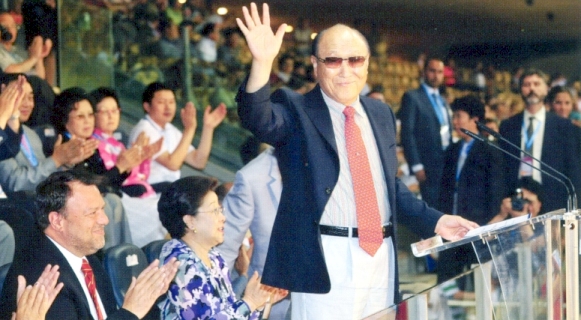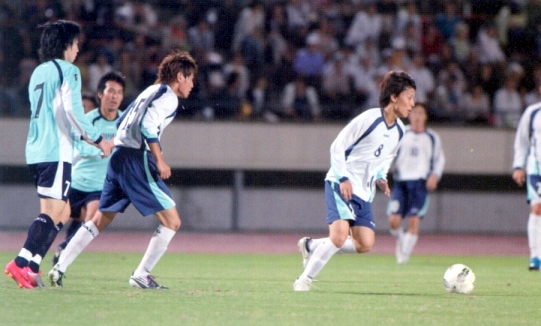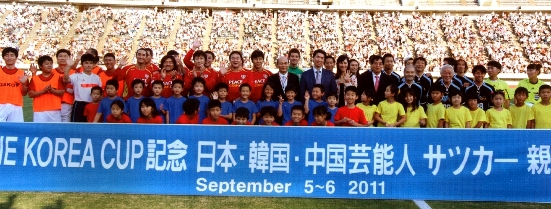![]()
The Words of the Kim Family after 2009
|
|
The Words of the Kim Family after 2009 |

Believing
in soccer's potential as a catalyst for conflict resolution, Father
has invested in the sport with that end in mind. It was during the
1990s, while True Parents led the South American providence, that
Father acquired the Brazilian soccer team Sorocaba. Here, Father
opens the Peace Cup in Madrid, Spain, in 2009.
In April 2009, Father suddenly asked me if I could bring the Sorocaba soccer team from Brazil to Korea within three days.' I replied that it would be difficult considering passport and visa issues and other practical matters. The conclusion we reached was to bring eleven people -- because there are eleven players on a soccer team -- by April 19, the day True Parents' birthday, their wedding anniversary, the Blessing Ceremony and other events were held that year. I was to have at least eleven people take part in these events while the rest were to come to Korea as quickly as possible. They should arrive no later than the twenty-first, because there was to be a game against the Il Hwa team at their home stadium in Seongnam as a part of the Wongu Peace Cup inaugural tournament.
It was a challenge but I contacted the team and was told that among the athletes, six had a passport and visa. I included myself, my wife, my son and two Brazilian students studying in Korea to make the eleven and we went to the events on the nineteenth.
After the game against Il Hwa on April 21, True Father said that we had to play against teams from North Korea, China, Japan and South Korea by the end of April. How could we accomplish all that in just ten days? We can't go to North Korea. We need visas to enter China and also Japan. Yet within the next three days, while Sorocaba was playing matches in Korea, we managed to obtain visas for Japan. We went to Japan and played a game against the Chongryon, the pro-Pyongyang Korean Residents' League.

Left:
Heung Tae Kim presents a pennant and Sorocaba jersey signed by the
players to a North Korean soccer team official in Pyongyang; Middle:
The Sorocaba team at the Il Hwa Company in South Korea; Right: Sang
Gwon Park oversees the football providence in Korea and beyond; his
business leadership experience is a key factor in this role
I had virtually given up on holding a game in China -- it was difficult to get a visa and time was against us -- when suddenly Hong Kong came to mind. It is a part of China but we wouldn't need a visa.
I called Thomas Hwang to tell him that we would take a flight the following day and asked him to prepare a soccer team by any means possible. A dean of the Hong Kong Baptist University is an ambassador for peace. He agreed to prepare a team from the university. We went there, held a match, and won 1-0.
The next day we arrived back in Korea and gave a full report. I explained to Father that we had played against the Pohang Steelers in South Korea, against the Chongryon team in Japan and against a team in Hong Kong, China.
Father responded, "Oh, really? You played against the Steelers in South Korea. You went to Japan and played against Chongryon, which means you basically played against a team from Japan and North Korea. And you've been to China. This signifies your having gone to all four nations."
He then called for Peter Kim and told him to revise the speech for the event to take place at the Cheon Jeong Peace Palace two days later, May 1, to commemorate the founding of HSA-UWC. That is why Father told the audience that the Sorocaba team was there and asked the audience to give the team a round of applause.

The
game between the Mindan and Chongryon teams. After the game, Dae
Gyeong Kim of the winning Chongryon team said, "If you play a
game, of course you want to win; we had that mind-set, but when the
game was over, we felt that by our origins, because we are of the
same blood, we are brothers." Jeong Wook Kim of the Mindan team
was similarly broad-minded: "Even though we couldn't win, it
doesn't matter overall whether we are pro-North or pro-South if there
can be a good meeting of minds."
While I was in Japan for Sorocaba's match against the Chongryon team, the vice-chairman of the North Korean Soccer Federation was also there. He came to the game, where we met. During the match, he said "Comrade, Wow! The Sorocaba team plays very well."
I replied, "They are good, aren't they?" In the end, he wanted to invite the Sorocaba team to North Korea.
I said, "Please do." Originally, I had not thought he was serious, but after he returned to North Korea, he contacted me within a week saying that he could invite our team to Pyongyang. He informed me that the North Korean soccer team was going to be at the Southeast Asia Soccer Tournament on August 25 in Kaohsiung, Taiwan. Since I could not easily go to Pyongyang and he was unable to come to South Korea, he suggested that we meet in Kaohsiung. I agreed.
I went by myself. By then the Peace Cup Tournament in Spain had concluded, so I had a lot of good material from that to show him. The North Korean officials seemed quite impressed, seeing that Real Madrid and other good teams had participated in the Peace Cup.
Apparently, the same day that we met he reported to North Korea about what I had shown him. The next day, I received a faxed invitation letter from the president of the North Korean Soccer Federation, inviting the Sorocaba soccer team to Pyongyang. The Sorocaba team went to Pyongyang in October 2009 and played against the North Korean national soccer team.
They invited us again the following year, 2010. At that time, the president of the Soccer Federation asked if the North Korean women's soccer team could do some off-season training at Sorocaba. They had heard that the facilities at Sorocaba were good. In North Korea, it is very hard to train seriously in the winter months due to the extreme cold. February is the coldest time. In Brazil, though, that's the hottest time. I said it was a good idea for them to train using the Sorocaba facilities because the weather in Brazil in February would be similar to what they would encounter in Germany at the Women's World Cup in the summer of 2011.5 I made it conditional on the team paying its own airfare from North Korea to Brazil. A round- trip ticket from North Korea to Brazil is almost $3,000 -- that would come to about $90,000 for the thirty people that were to come. They came and stayed from February 2 to March 2.
In July, their men's youth team also came and trained for three weeks before taking part in the Under-20 World Cup in Colombia later that month. They were very satisfied with the training at Sorocaba. The training facilities sit on several acres of land. We have a recently built a hotel at a five-star level. Our facilities are nice. We covered the North Koreans' accommodations and meals. This was Father's initiative, and he had asked us to take care of them. In early March, I reported to Father in Las Vegas that the women's team had trained in Brazil. You can't imagine how happy he was.
I believe that True Father had probably already foreseen all this when giving that initial difficult instruction for us to bring Sorocaba to South Korea to play in 2009. Since we had had the mind-set to submit to his wishes, Heaven was able to work in this way and this providence unfolded.
After Sorocaba played against the North Korean national team in 2010, the North proposed holding a tournament for teams from four countries in 2011. This took place October 22-27. Because of the short preparation time, the team invited from Beijing could not come. A team from Khavarosk in eastern Russia, the North Korean team and Sorocaba from Brazil all played each other. These games went very well. The North Koreans had taken another step forward by inviting clubs from overseas to Pyongyang for a tournament.

The
One Korea Cup in Japan last September brought teams from Mindan and
Chongryon into friendly competition. It was when Sorocaba played
against the Chongryon team two years earlier that the opportunity for
them to play in North Korea was born.
At the end of World War II, there were two million Koreans in Japan. More than a million were repatriated to their homeland. Those that remained in Japan formed resident associations; one, Chongryon, is supportive of North Korea and the other, Mindan, is supportive of South Korea.
Korea's partition has persisted for some sixty years. This is true in Japan too. These Korean residents must become the foundation for the reunification of the Koreas. For that purpose, Father created a Korean Reunification Department in the Japanese church headquarters.
The headquarters and the Sorocaba organization hosted the One Korea tournament. True Parents directed Kook-jin nim to go to Japan as the person in charge of the tournament. He delivered a speech at the welcoming banquet and made the declaration opening the tournament the following day.
Though we wanted to hold the tournament, if the North Korean government had objected, it would not have been held.' Our ongoing activities in Japan with Koreans resident there, including bringing many of them to Korea in 2005 and 2006, holding rallies with them and workshops centered on True Parents, were what made it possible for twenty thousand people -- Japanese Koreans in Chongryon and Mindan and Japanese Unification Church members -- to come to watch the matches.
From the Principle view, Tamar became pregnant with Perez and Zerah, who were divided like Cain and Abel, but through the restoration of the right of the first son in the womb, the lineage connecting to Jesus was established. Chongryon and Mindan represent Perez and Zerah, and Japan is Tamar's womb.
It is significant that our church hosted this tournament. It is significant that Chongryon, the Cain side, and Mindan, the Abel side, came and played a match.
In order to bring about the reunification of the Koreas, Japan, China, North Korea and South Korea must act toward that purpose. That is why we had Japanese, Chinese and Korean celebrities from the entertainment world form two teams and play the first game, which lasted from 5 PM to 7 PM. The Japanese team won. On that foundation, the main game between Chongryon and Mindan took place (Chongryonwon). For the three hours, through two matches, the audience chanted "One Korea" from the stands, creating an atmosphere welcoming unification.
North and South Korea do not have very many channels through which to communicate. In that light, we are trying to create the opportunity for the two Koreas to communicate through soccer.